It’s potato season in Hungary. It’s always potato season in Hungary. In this part of Eastern Europe, the tuber is an everyday staple, even known as “second bread” in some parts of the region. Today, Saturday, we went grocery shopping at a nearby open-air farmers’ market. Along with onions, peppers, and some chicken, we also bought potatoes. We plan to put them in gulyás, the quintessentially Hungarian dish that, of course, requires lots of potatoes.
Before we moved to Budapest, I spent three years doing ethnographic research in central Romania. I lived in a region inhabited by a Hungarian-speaking ethnic minority called the Székely. In Hungarian, this area is called the Székelyföld.
For about two years, I rented a room from a Székely family of normal means. Normal meant meat was a special treat, set aside for Sundays and holidays. Weekday meals, in contrast, were various versions of cooked potatoes and dairy. Both are abundant in the Székelyföld, where potatoes are a staple crop and even modest farmers have one or two cows in their backyard barns.
Although potatoes are stereotypically associated with Ireland, the Székely are also proud consumers of this tuber. During my stay, the regional government put on a potato festival to celebrate the creativity Székely potato cuisine. They called the festival, Pityókaland.
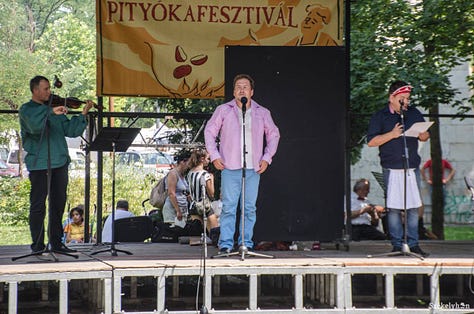
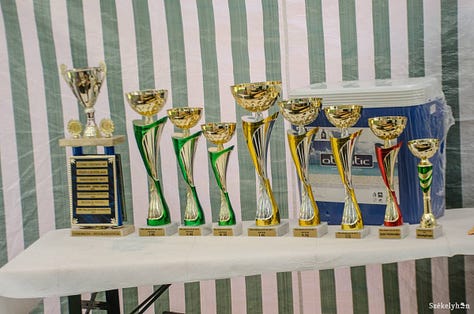
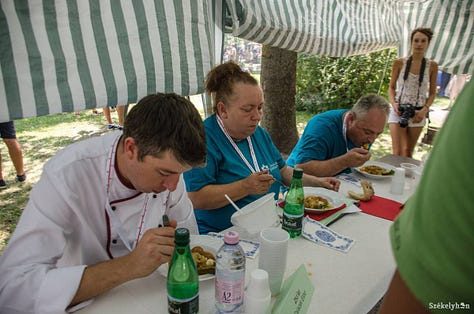
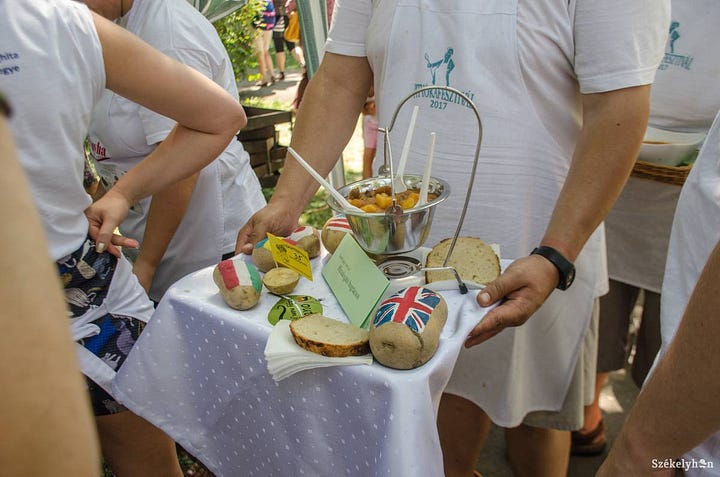

Pityóka is the Székely Hungarian word for potato. Kaland is the word for adventure. The shared ka in both words makes a natural mashup. Bad pun intended.
But if you take pityóka by itself, it becomes pityóka land: Potato Land, the “land” being an English word. Put all three together and you get, Land of Adventurous Potatoes.
The Székely are a bit like Budapest Hungarians’ rural in-laws: The city mouse’s country cousin in Aesop’s story, or “The Little Peasant” who goes to town and gets lost in the Grimm Brothers’ eponymous tale. Széklers even bike at a sauntering pace. After I settled into a Székler hamlet, I asked my village landlord why farmers pedaled so slowly. He paused for a moment, and then said, in all seriousness, “Why hurry? The potatoes aren’t going anywhere.”
Potatoes arrived in Székler villages about three centuries before I did, during the 1700s when Austrian Habsburg kings ruled the region. But when the Habsburgs tried to get Széklers to grow the new plant, it flopped. They refused, prompting a law requiring they plant potatoes or face imprisonment. The law had a biological rationale: Potatoes are good for you, especially when food is scarce. As I have personally experienced, with just a bit of added dairy fat, humans can survive indefinitely on potatoes, which thrive even under drought conditions.
But the Habsburgs were not the peasantry’s benevolent dictators. Potatoes were also a brutal weapon, a cop’s baton in digestible form. If villagers are busy hoeing in small groups in their villages, it means they’re not gathering in bigger groups, not learning about their rights, and, especially important, not demanding them.
Potato farming keeps peasants busy because it’s so damn hard. My first autumn in the Székelyföld, I asked my neighbor Dénes if I could help him with his harvest. He was confused but eventually agreed. So that October, along with Dénes’ five kids, several aunts and uncles, and even a grandparent, I spent several days following behind his tractor sorting the potatoes that a massive rake-like attachment had ripped out of the ground.
Potato collecting is stultifying work. The extent of our intellectual stimulation that day was discerning between three classes of potatoes: small (apró in Hungarian) for replanting; middle (közép) also for replanting; big (nagy) for eating. When we weren’t bending over to pitch potatoes into plastic flower pot-sized buckets, we stretched our backs and watched the tractor. We stared dully at the machine as Dénes, in the driver’s seat, bounced slowly toward us and then away, toward us and away.
Kilometers from the nearest road, which didn’t have much traffic on a busy day, there wasn’t anything else to look at besides the tractor and a whole lot of dust.
(If you think that was tedious, another year I harvested with a neighbor who wasn’t wealthy enough to own a tractor. He hitched his family’s cow to a cart and plough. If you think a tractor is slow, try standing and waiting for a cow go back and forth across a potato patch.)
Weary of just watching Dénes in his tractor, I once tried to get his attention for a bit of nonverbal communication. He had twisted in his seat to make sure he got a spot, and when he turned back around I caught his eye. On a whim, which was born of my desperate boredom, I extended my arm and held out my thumb in the hitchhiker’s universal appeal.
You should also know that, while I was in the Székelyföld, in addition to picking potatoes I spent a lot of time hitchhiking. I had a bike to get around the village. But I chose not to get a car, having read anthropologist Paul Rabinow’s seriously hilarious fieldwork narrative, Reflections on Fieldwork in Morocco.
Rabinow himself brought a car to the Moroccan village where he was to study rural religiosity, but his friends in the village so deluged him with requests for rides into town that he began worrying he wouldn’t get any research done. Finally, Rabinow’s car exploded - right after getting an expensive tune up from a master mechanic in the city. Rabinow only felt relief. “I was finally rid of the wretched thing,” Rabinow recalls in his memoir.
Hitchhiking, I thought, seemed to be a better option for me. Plus, pretty much every type of person spent at least some time waiving down drivers on the side of the road, from hipster teenagers to Székely grannies straight out of peasant central casting.
I had even gotten to know hitchhiking’s subtle gestural language and age-related styles. Grannies tended to waive at drivers if they wanted a ride. They kept their arm straight out at the shoulder, palm turned down, and flapped stiffly at the air. Younger ride-seekers used the basic thumb gesture.
And drivers could signal back, too. For instance, if a driver jabbed his pointer finger downwards, this meant, “Sorry, it may seem that I’m going in your direction, but I’m actually taking the next left turn to my house. So really it’s not worth it for me stop and pick you up.”
A much shorter translation: “Sorry, I’m staying local.”
Dénes was thoughtful and quiet, but not impossibly serious like some other Székely. I’d never really joked with him before. I was nervous he might not be up for quirkiness, but I was relieved and excited when I saw his eyebrows twitch upward. (In the Székelyföld, this passed for a big impression; the Székely aren’t especially expressive.)
Then I saw a smirk. And then, to my pleasant surprise, Dénes lifted his right hand from the wheel and pointed his finger downward.
“Sorry,” Dénes signaled, before turning the wheel to make another furrow, “this tractor is staying local.”
So long as we were harvesting these potatoes, I thought to myself with a smile, we weren’t going anywhere. I think now that this joke - plus the idea that we were tied down by our potato labor - was more political than I could have realized.

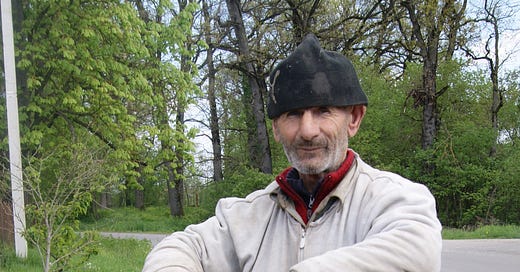


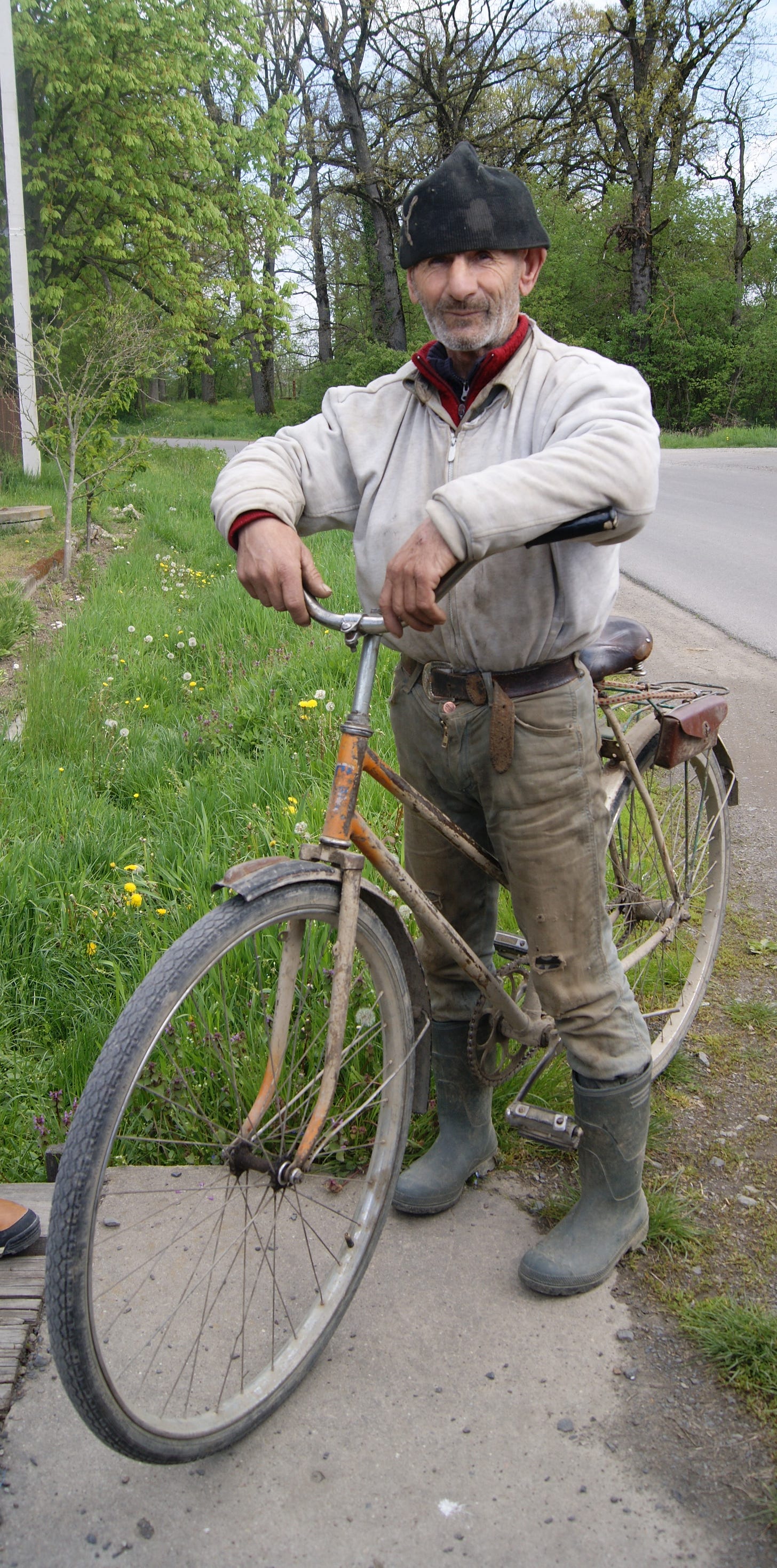
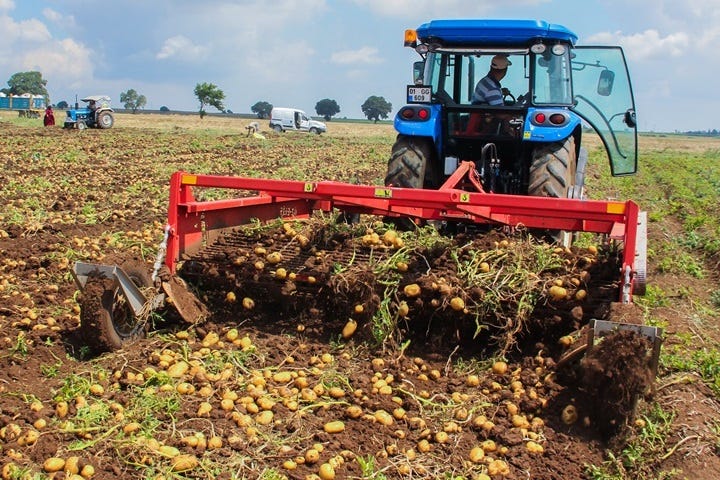

Thanks, David! That means a lot!
As someone who grew up farming, I love this look at the culture!